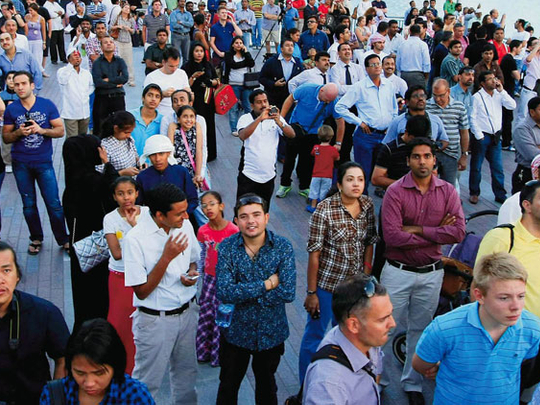
Dubai: An overwhelming majority of Dubai residents said they feel safe and protected and happy and satisfied with family life while living in the emirate, a new government survey has revealed.
Some 96 per cent of Dubai residents said they feel safe and protected from crime in Dubai in general, according to the third Dubai Social Study released by the Community Development Authority (CDA) on Monday. The figure increased from 92.80 per cent in the first study in 2011.
The extent of happiness felt by residents — covering the year before the study was conducted — was pegged at 8.08 on a scale of 0 to 10, with 10 being ‘extremely happy’. This perception of happiness also increased compared with the 7.9 rating in 2011. Westerners report being the happiest, followed by Emiratis, then Arabs, while Asians and Africans took the last spot.
“The indicators are showing improvement. Something must have happened for these numbers to go up,” Khalid Al Kamda, CDA Director-General, told Gulf News.
“They come from [an action] that had impacted positively on the service [they received] and how people feel,” he added.
The Dubai Statistics Centre conducted the study during the last quarter of 2013 in partnership with CDA. They surveyed 3,796 families composed of 1,328 Emirati households, 1,504 non-Emirati households, 464 collective families and 500 individuals from labour accommodations.
“The sampling included all residential areas of Dubai that we classified into clusters. Out of the clusters, we took random samples representative of the population to ensure that all areas are covered. For the labour accommodations, all those registered with the centre were represented,” Dr Tarek Hashim Ebrahim, Director of Research and Policy Development at CDA, told Gulf News.
The survey, however, did not include domestic workers. It also didn’t include visitors.
The results don’t come as a surprise to Dr Rima Sabban, a sociologist and an associate professor at Zayed University.
“The city’s engineering [and urban planning] has allowed different communities in different places. Bachelors are not mixed with families so the state tries to deal with it relatively,” Dr Sabban told Gulf News.
“There is a high presence of security systems in Dubai but it has managed to keep them to a certain level of invisibility. The only thing you see constantly are security cameras. They also reinvented the concept of police, that they are there to look after the community more than policing them.”
Westerners are also the most satisfied group of people when it comes to family life at 99.7 per cent. Arabs come next at 99 per cent, followed by Emiratis at 97.3 per cent. Asians and Africans expressed a 97 per cent rate of satisfaction with family life.
When quizzed by the media on whether salary packages were a consideration why the figures showed up as they did, Al Kamda denied that there is a connection.
“The target audience for this survey has nothing to do with salary bracket. We have chosen the sample from each and every individual living in this emirate. But is it [perception of happiness] different for the rich people and poor people? No. It’s about how they perceive happiness, how happy they are within their own environment, whether they are a labourer or an executive,” Al Kamda clarified.
The feeling of safety from unfair work practices is lowest in respondents from labour accommodations at 56.9 per cent and highest among Emirati families.
Al Kamda attributed this to the perception of instability in the construction industry coming from the experience during the global recession in 2008.
Some 92.5 per cent of non-Emiratis said that their rights as human beings are preserved. Some 77 per cent of the respondents said they feel able to fight for their rights through legal channels. The perception is lowest among labourers, however, at 66.4 per cent.
Almost all respondents said they enjoy freedom of religion in addition to the feeling of being treated equally first by policemen, then by judicial entities, health facilities, and other government entities.
Al Kamda said the survey results will be shared with relevant government authorities to improve the delivery of needed social services.








